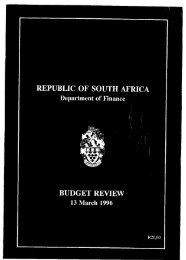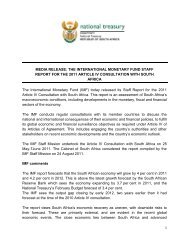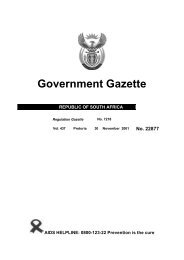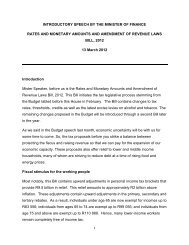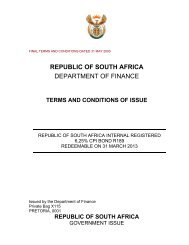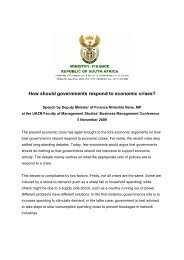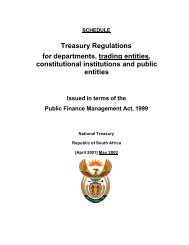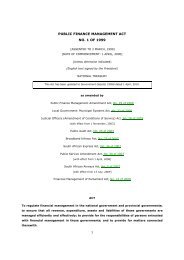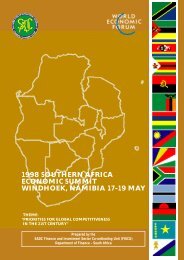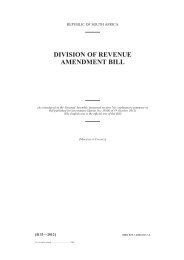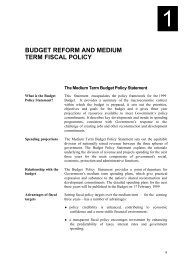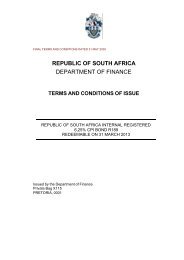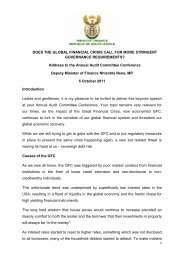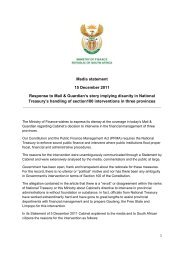Annual Performance Plan Jaarlikse ... - National Treasury
Annual Performance Plan Jaarlikse ... - National Treasury
Annual Performance Plan Jaarlikse ... - National Treasury
You also want an ePaper? Increase the reach of your titles
YUMPU automatically turns print PDFs into web optimized ePapers that Google loves.
Strategy: A Multi-Sectoral Framework for Action in the Western Cape 2006 to 2011 further unpacks this strategy in<br />
response to the national, multi-sectoral HIV & AIDS and STI Strategic <strong>Plan</strong> for South Africa, 2007-2011.The Western<br />
Cape Provincial AIDS Council, which includes representation of education through the MEC, has endorsed the<br />
Accelerated HIV Prevention Strategy, 2006 to 2011.<br />
Given the HIV/AIDS programme’s transversal and social capital nature (and its close but presently unstructured<br />
relationship with similar social challenges in education, such as drug abuse, teenage pregnancy, sexual abuse,<br />
behaviour modification and other youth-based strategies) the WCED’s organisational re-design holds the potential for<br />
an improved alignment of related social challenges, greater efficiency of personnel utilisation, reduced duplication of<br />
services, and greater all-round impact. Notwithstanding this, however, the HIV/AIDS response continues to resist the<br />
silo effect of the present WCED organogram, and responsibilities are increasingly being shifted to the relevant line<br />
function in the various head office directorates and district office components, so as to ensure greater efficacy and<br />
sustainability beyond conditional grant funding.<br />
Khanya Technology in Education Project<br />
The Khanya Project will establish computer laboratories in a further 200 schools.<br />
Progress analysis<br />
HIV/AIDS Conditional Grant:<br />
All schools are clustered (5-20 per cluster) for advocacy, training and ongoing support. All schools have designated<br />
HIV/AIDS co-ordinators and/or committees. Cumulatively, 17 124 educators had been trained by 2006/07 (against a target of<br />
16 000).An estimated 820 000 learners (85%) receive regular HIV/AIDS life skills education (within the context of Life<br />
Orientation).Whilst preventative education through Life Orientation remains the backbone of the programme, the focus is<br />
now shifting towards integration of HIV/AIDS across the entire curriculum (‘Achieve’ programme).<br />
Development and translation of training materials into all three official languages is completed. All schools receive annually<br />
their exact requirements of curriculum-based LTSM. Each school, from 2007/08, will receive 10 resource files (for SMT and<br />
SGB members) to enable the school to workshop the development of a School HIV/AIDS policy and a School HIV/AIDS<br />
Management <strong>Plan</strong> (within a WSE and SIP framework).This will include leadership and workplace issues. Each schoolcommunity,<br />
from 2007/08, will also receive 10 Care and Support Strategy resource files to enable SMT/educators, SGB<br />
members and community-based partners to develop social capital and networks of support for orphans and other vulnerable<br />
children inclusive of those affected by AIDS (within a White Paper 6 / Inclusive Education context, and thus further promoting<br />
the development of district-based support teams and educator support teams).90 School Psychologists and Social Workers<br />
have also been trained as professional HIV/AIDS counsellors, for high-level learner support to schools, on demand. An NQF<br />
Level 4 qualification and short course in Basic Counselling and referral skills has also been finalized and will be offered to<br />
educators and SGB members from 2007.<br />
The collaborative GoLD peer education programme (in partnership with the Department of Health (DoH) and NGO service<br />
providers), now in 136 schools, was in 2006 a finalist in the Premier’s Service Excellence awards, and won the international<br />
Commonwealth ‘Good Practice in Education’ award. A formal external evaluation of this programme (as well as the other<br />
partnership initiative with DoH and love Life) was also completed by the University of Cape Town in 2006, and together with<br />
the province’s Accelerated HIV Prevention Strategy, indicates important challenges ahead.<br />
The HIV/AIDS curriculum-based life-skills programme was also twice evaluated by the national department in 2006, to<br />
assess programme delivery in schools, and the Auditor-General undertook, for the second year, a Value-Added Audit in<br />
addition to the usual compliance audits. The HIV/AIDS programme was thus the first in the WCED to undergo such scrutiny,<br />
now over two years, and has been used as an example to the department of how other programmes and services will, in<br />
future, be assessed for quality of outcomes (and thus taxpayers value-for-money), rather than just inputs and outputs.<br />
Interestingly, all evaluations pointed to a severe personnel shortfall. Nonetheless, district-based HIV/AIDS personnel<br />
continue to regularly visit schools to ensure that the programme is implemented, to trouble-shoot, and to address the broader<br />
needs of the school community with respect to prevention, care and support for educators and learners infected and/or<br />
affected by HIV/AIDS. Finally, a number of research projects and pilot studies are well underway and these continue to<br />
enable the programme to adjust to new insights and ‘best practice’ on an ongoing basis.<br />
Teacher Training<br />
This initiative began with 24 bursary recipients in 2001 and has grown to 90 in the 2006 academic year.<br />
<strong>Annual</strong> <strong>Performance</strong> <strong>Plan</strong> 2007/08 – 2009/10<br />
73



